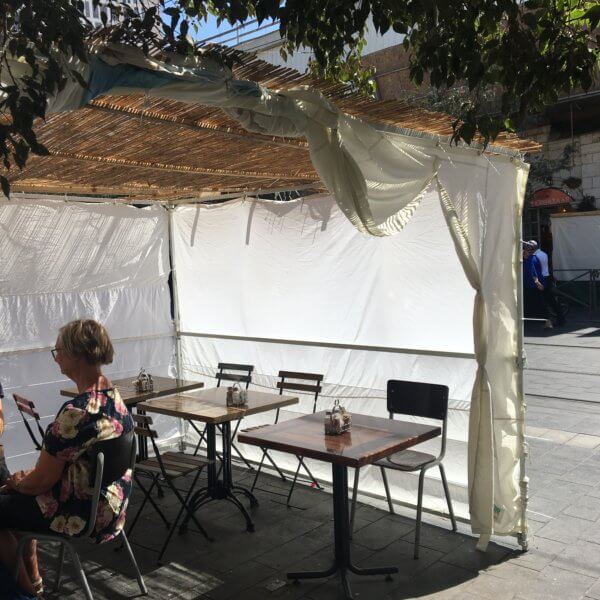
Happy Thanksgiving!
Today is a day of rejoicing. Thanksgiving has a complicated history, though. Even our liturgies in The Episcopal Church recognize this. Our companion prayer book, the Book of Lesser Feasts and Fasts, eliminated Thanksgiving from the celebrations of non-major church feast days when it was amended in the 2018 General Convention because of the concerns over the British and European conquest of lands and domination of aboriginal cultures. And we see that in our lectionary for today. The lectionary gives us the specific readings for specific days, and our Thanksgiving lectionary gives us the wonderful reading from Deuteronomy:
When you have come into the land that the Lord your God is giving you as an inheritance to possess, and you possess it, and settle in it, you shall take some of the first of all the fruit of the ground, which you harvest from the land that the Lord your God is giving you, and you shall put it in a basket and go to the place that the Lord your God will choose as a dwelling for his name.
As an inheritance to possess.
Our ancestors in the faith had the same history of conquest as the Pilgrims do in the United States.
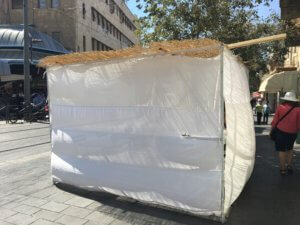 I spent last year in Jerusalem on an academic fellowship at St. George’s College. Away from the United States, there was of course no cultural celebration of Thanksgiving, but the Dean of the College generously went out to the American grocery in West Jerusalem and bought cranberry sauce, gravy, and a turkey breast for the four Americans on the Close — the bishop’s chaplain and his wife, the College Course Director, and me — to have a little bit of home. It was a revelation celebrating Thanksgiving in that context, as it happened around the time of Sukkot, the Festival of Booths, which is the Jewish celebration of the harvest. Sukkot and a closer look at our Deuteronomy passage for today gave me some insights into Thanksgiving and how God invites us to celebrate.
I spent last year in Jerusalem on an academic fellowship at St. George’s College. Away from the United States, there was of course no cultural celebration of Thanksgiving, but the Dean of the College generously went out to the American grocery in West Jerusalem and bought cranberry sauce, gravy, and a turkey breast for the four Americans on the Close — the bishop’s chaplain and his wife, the College Course Director, and me — to have a little bit of home. It was a revelation celebrating Thanksgiving in that context, as it happened around the time of Sukkot, the Festival of Booths, which is the Jewish celebration of the harvest. Sukkot and a closer look at our Deuteronomy passage for today gave me some insights into Thanksgiving and how God invites us to celebrate.
Sukkot
Sukkot has two basic scriptural roots, one celebrating harvest time and one commemorating God’s faithfulness to the Israelites while they were wandering in the desert after the exodus from slavery in Egypt. Interestingly, the commemoration of God’s faithfulness after the exodus is contained in Leviticus 23:39-43, although that passage also contains some harvest metaphors. Exodus 34:22 only refers to the harvest, or ingathering. The Leviticus passage says that on the ritually specific day when the harvest has been completed, the seven-day festival starts.
The first day is a day of complete rest, like Shabbat, the sabbath – no working, no cooking, no pushing buttons or driving cars. Then the 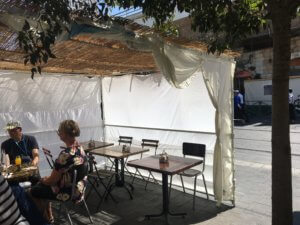 festival starts, with music, feasting, celebration, and – most importantly – living in booths:
festival starts, with music, feasting, celebration, and – most importantly – living in booths:
You shall live in booths for seven days; all that are citizens in Israel shall live in booths, so that your generations may know that I made the people of Israel live in booths when I brought them out of the land of Egypt: I am the Lord your God.
What is a Booth?
So what’s a booth? I’ve read Leviticus before and certainly knew about the “festival of booths,” but culturally, none of it fit into my context. In my world and experience, Clark Kent goes into a booth – a phone booth – and bursts it open once dressed as Superman. We always want a booth in a restaurant because they’re usually quieter, more comfortable, and out of traffic.
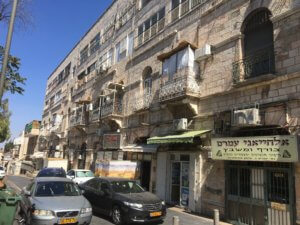 But that’s not the idea here. Think outdoor patio structures, roofed in woven bamboo slats and decorated with palm fronds, with seating and tables for outdoor dining. The Hebrew word sukkōt is the plural of sukkah, which means “booth” or “tabernacle” – a walled structure covered with plant material like palm fronds. A sukkah is the name of the temporary dwelling in which farmers would live during harvesting, which refers to the agricultural significance of the holiday emphasized in the Book of Exodus. Booths are also reminiscent of the fragile dwellings of the Israelites during their 40 years of travel in the desert after the exodus. Throughout the holiday, people eat their meals and even sleep inside the sukkah.
But that’s not the idea here. Think outdoor patio structures, roofed in woven bamboo slats and decorated with palm fronds, with seating and tables for outdoor dining. The Hebrew word sukkōt is the plural of sukkah, which means “booth” or “tabernacle” – a walled structure covered with plant material like palm fronds. A sukkah is the name of the temporary dwelling in which farmers would live during harvesting, which refers to the agricultural significance of the holiday emphasized in the Book of Exodus. Booths are also reminiscent of the fragile dwellings of the Israelites during their 40 years of travel in the desert after the exodus. Throughout the holiday, people eat their meals and even sleep inside the sukkah.
Waving the “Four Species”
Another part of the Sukkot celebration is the ceremonial waving of the “Four Species” specified in Leviticus 23:40: On the first day you shall take the fruit of majestic trees, branches of palm trees, boughs of leafy trees, and willows of the brook; and you shall rejoice before the Lord your God for seven days. During Sukkot, Jewish men rush around everywhere carrying several of the ubiquitous bundles of the “Four Species” (fruit of a citron tree, the closed ripe frond of a date palm tree, boughs with leaves from a myrtle tree, and branches with leaves from a willow tree). They are taking them home to their family celebrations of Sukkot. They need them for the “waving ceremony” performed by Jewish men on each of the 7 days of Sukkot.
People spend a great deal of money and attention ensuring that they have just the right bundle, joined in just the right way, and a father will 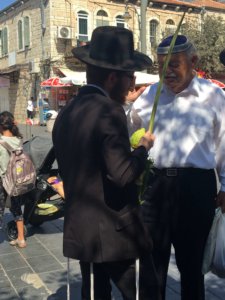 be sure that each of his sons has a bundle of the Four Species for the waving ceremony. We see men hurrying on the streets, on the tram, in the market, and through the old city, each carrying a fresh bundle or two of Four Species for that day.
be sure that each of his sons has a bundle of the Four Species for the waving ceremony. We see men hurrying on the streets, on the tram, in the market, and through the old city, each carrying a fresh bundle or two of Four Species for that day.
We are very aware from the news of all of the conflict in Jerusalem, Palestine, and the State of Israel. But — or I should say AND — there’s a parallel reality. There’s another thing that’s true ALL AT THE SAME TIME. My sense after living in Jerusalem for a year is that God is in minute-by-minute dialogue with the people of that land.
Respect and Space
Despite what we know and see about conflict in regard to land, self-governance, and authority, there is also respect and space for the different ways in which the People of the Book – Jewish, Christian, and Muslim – interact with God. Often — usually every Friday evening as I rang the bell for Evening Prayer at St. George’s Cathedral — on the last toll of the bell, the shofar would sound to begin Shabbat, the Jewish Sabbath. And the muezzin would be sounding, calling Muslims to one of their five daily times of prayer. During Ramadan, Christian coworkers take a greater share of the load in the workplace, just as during Christmas, Lent, and Easter, Muslim workers support their Christian colleagues with more time for religious observances and worship.
In some ways, the near-simultaneous calls to prayer resemble the Anglican tradition of singing and chanting in four-part harmony: our voices, singing different harmonizing notes and complementary rhythms, emphasize that many are singing together as one. When I heard the church bells, the muezzin, and the shofar all sounding at once – all calling the people all over the city to turn to God – it seemed for that moment that the people of the book move together in harmony. That’s when it occurred to me that the Deuteronomy reading for our Thanksgiving service — the one that seems to say we should celebrate taking over for our own another people’s land — actually has more to say to us.
Here’s the last part of our reading today again:
Then you, together with the Levites and the aliens who reside among you, shall celebrate with all the bounty that the Lord your God has given to you and to your house.
We’re supposed to celebrate together. We’re supposed to share. We’re supposed to follow our Christian commandment of love of neighbor and LOVE OF STRANGER — remember that the word hospitality specifically means “love of the strange.”
Let’s go forth rejoicing, to celebrate the bounty of the Lord. Amen
